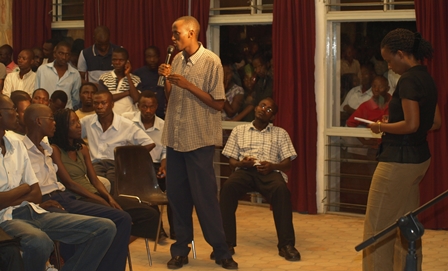Burundi: University students discuss ways to overcome ethnic divisions

October 1993 was the start of a civil war which tore Burundi apart for more than a decade and caused the death of an estimated 300’000 people. Interpeace’s local partner in Burundi, the Centre of Alert and Conflict Prevention (CENAP), recently commemorated these terrible events by engaging the students of three major universities in activities aimed at transcending the ethnic and political cleavages which are still relevant in Burundian society. These cleavages have been deepened by the country’s violent crises, especially the one of 1993.
Questioning the legacy of the past
Most university students were too young to be actively involved in the civil war, but they continue to be affected by its legacy. “Since I was little, my family has always been asking me things about my friends, like: ‘Do you know their real identity? How can you share a table with people from the murderers’ ethnicity?,’” a student explained. “Were I to marry someone from another ethnic group, my family would perceive it as treason in view of what we suffered in 1993.” Another student added: “It is very frustrating to know that on the job market, political and ethnic considerations count more than skills. It also reinforces mistrust towards the other ethnic group.”
Most students, however, refuse to accept this state of affairs. One participant added: “The tensions between Hutus and Tutsis are absurd and are mainly caused by political manipulation.” “What exactly is the basis for ethnic divisions?”, another student asked. “Some say it is in our blood. So if a Tutsi received a blood transfusion from a Hutu, would that change his ethnic affiliation? In my opinion, ethnicity is in our heads. We must change our mentality and focus on peace and development.”
Working with tomorrow’s leaders
For three days CENAP organized the screening of a film at Burundi, Lac Tanganyika and Lumière Universities. Based on different focus group discussions with students, the film produced by CENAP documents students’ memories of the 1993 crisis, the impact it had on their personal and student lives and their recommendations for bigger cohesion among youth.
The screenings were followed by debates which focused on the influence and impact of the 1993 crisis on cohesion among youth. The students were encouraged to discuss strategies to go beyond ethnic divisions. A lot of participants expressed their desire to have opportunities to exchange ideas on these sensitive issues more often.
Victims of the Burundian civil war are usually remembered at separate events depending on their ethnicity, but since last year, CENAP has been working towards joint commemorations. Thereby, they strategically chose to involve university students in the commemorative events as many of them will eventually occupy influential positions in Burundian society. Enabling them to see beyond the ethnic barriers and to find ways to overcome them is key to building lasting peace in Burundi.
A need for dialogue
After the screenings the students were able to have stimulating debates about solutions to break the cycle of mistrust. “The film touches on real issues that are not discussed openly,” said one participant. “But we need to talk about these things if we hope to move forward.”
The discussions highlighted the need to make a conscious effort to go beyond ethnic divisions and most importantly, not to pass these divisions down to future generations. “We need to create dialogue spaces where people can learn to trivialize their differences,” one student suggested. Most agreed that they could already start making a difference by speaking out against the divisive behaviour they encounter among friends and relatives.
